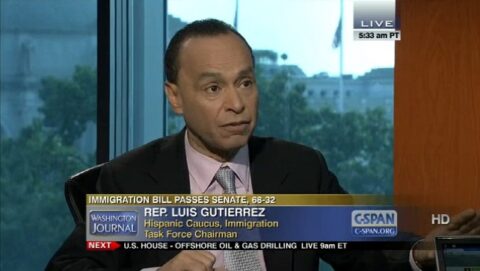Immigration Reform

Immigrants Boost Economic Vitality through the Housing Market
Abundant research shows that immigration is a net benefit to the United States’ economy. It leads to higher wages, business formation, job creation, and greater innovation – nationally and locally. Foreign workers who immigrate to the U.S. help alleviate labor force gaps left by a workforce increasingly nearing and entering retirement age. Furthermore, immigrants help fulfill growing healthcare needs of an aging population. In addition to these positive benefits of immigration, the favorable effect immigrant home-buyers have on the housing market is another important economic impact. Indeed, new research from the Americas Society/Council of the Americas and the Partnership for a New American Economy describes how the 40 million immigrants residing in the United States added $3.7 trillion to housing wealth in the U.S. The research, prepared by Jacob Vigdor at Duke University, uses county-level data on population and housing from the U.S. Census Bureau and American Community Survey from 1970 to 2010. The results show that immigration led to a boost in home values, particularly in neighborhoods hit hardest by the U.S. housing bust. Read More

Spotlight Moves to House After Senate Approves Immigration Bill
Now that the Senate has passed a sweeping measure to improve U.S. immigration policies, the attention turns to the House of Representatives, where it is unclear exactly when or how they will take up an immigration bill. The Associated Press reported that President Obama called House Speaker John Boehner (R-OH) and House Minority Leader Nancy Pelosi (D-CA) after the Senate vote to urge them to have the House act on an immigration bill. Earlier this week, Boehner said the House would not take up S. 744 and would do its own bill instead. If the House passed a separate immigration measure, then a conference committee with members from both chambers would meet to reconcile the differences. Read More

Senate Passes Landmark Immigration Reform Bill
The Senate approved a massive overhaul of the nation’s immigration policies today in a historic vote. They voted 68-32 to approve S. 744, the Gang of Eight’s immigration reform measure that the Senate Judiciary Committee passed in May. Immediately after the vote, Sen. Dick Durbin (D-IL), a member of the Gang of Eight and sponsor of the DREAM Act, tweeted, “Today, we have accomplished something great, made America a stronger nation & honored our heritage as a nation of immigrants.” Before they cast those votes, Senate Majority Leader Harry Reid reminded senators of the human side of immigration. “We’re here to talk about people, not pages of legislation,” he said. Read More

Beyond the Border Surge, What Else Is In the Senate Compromise?
On Monday, the Senate voted 67 to 27 to invoke cloture on Leahy 1183, an amendment to substitute the current version of the Senate’s immigration reform bill, S. 744, with a revised version of the bill that includes a host of amendments that have been referred to as the Corker/Hoeven compromise—or, more simply, the border surge. Thirty hours from that vote—sometime Wednesday morning—the Senate will actually vote on whether to adopt Leahy 1183. The cloture vote is a strong indicator of passage of the amendment and, many predict, of the bill overall. Read More

Nativist Group Fears an Immigration Tsunami Under Senate Immigration Bill
Throughout its history, the United States has benefited in innumerable ways from immigration. Men and women from every corner of the globe, with every conceivable skill set and educational background, have come here and added value to the U.S. economy and U.S. society. Likewise, the arrival of every new “wave” of immigrants has elicited shrill cries from nativists afraid that all of these newcomers will swamp the nation, throw native-born workers out of their jobs, and undermine “our” way of life. The nativists never seem to learn the lessons of history in this regard, because they keep making the same baseless claims, and indulging the same irrational fears, every generation. It doesn’t matter who the newcomers are—Germans, Italians, or Mexicans; Slavs, Africans, or Arabs—the arguments are always the same. Read More

Is a Border Surge the Only Way to Pass Immigration Reform and Ensure Legalization?
During the second full week of debate on S. 744, momentum towards passage increased with a positive CBO score, the defeat of several poison-pill amendments, and the announcement of a Republican border amendment that is thought to bring ten to fifteen Republicans to “yes” on final passage. A series of critical cloture votes is likely to be filed over the next few days, paving the way for a final vote next Friday. Despite this news, the mood is not jubilant, as good policy seems to be losing to pragmatic politics. Read More

Immigrants and Their Children Fill Gaps Left by Aging American Workforce
Over the next two decades, as the baby boom generation continues entering retirement, we will experience the largest exodus from the workforce by any generational cohort in American history. This wave of retirees will create a labor force deficit among the millions of jobs baby boomers depart from on top of new job growth industries create. Amid this great demographic shift, immigrants and their children are poised to play a critical role in filling workforce gaps left by massive baby boom generation retirements over the next twenty years, as a new forward-looking report from the Center for American Progress describes. Read More

CBO Gives High Marks to Senate Immigration Bill
Yesterday, the Congressional Budget Office (CBO) released its much-anticipated “scoring,” or cost estimate, of the Senate immigration bill. Overall, the numbers are good. Very good. The CBO projects 20 years ahead and predicts fiscal savings in the amount of roughly $1 trillion. In addition, the CBO explained in a separate report that the bill would have a host of economic benefits that are not captured in a strictly fiscal analysis, such as GDP growth, increased productivity, and long-term wage increases. Read More

How the Senate Votes On Amendments
The Senate voted on four amendments to the immigration reform bill today, starting the ball rolling on what is likely to be a series of amendment votes over the next few days. The Senate rejected two votes requiring more enforcement at the border as a condition of implementing or completing a legalization program: Vitter 1228, which failed 36-58, and Thune 1197, which failed 39-54. Two other amendments were less divisive: Tester 1198, adding tribal governments to the Border Task Force, which passed 94-0 and Landrieu 1222, an adoption measure, which passed on a voice vote. In each case, in order to be adopted, a sixty vote threshold was required, rather than a simple majority, which has become the norm in the Senate. Needless to say, the variety of votes and rules can be confusing, leading to the need for some background on the amendment process. Read More

Happy Birthday DACA!
A year ago, President Obama announced the DACA program from the steps of the White House Rose Garden. The announcement marked a victory for thousands of undocumented immigrant youth whose courage and activism inspired the Administration to take action. Since that day, over half a million young immigrants have come forward under DACA to seek relief from deportation and to secure work authorization. Read More
Make a contribution
Make a direct impact on the lives of immigrants.
